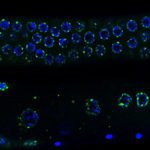Lien vers Pubmed [PMID] – 28148562
Genome Res. 2017 Feb;27(2):234-245
According to the current view, each microRNA regulates hundreds of genes. Computational tools aim at identifying microRNA targets, usually selecting evolutionarily conserved microRNA binding sites. While the false positive rates have been evaluated for some prediction programs, that information is rarely put forward in studies making use of their predictions. Here, we provide evidence that such predictions are often biologically irrelevant. Focusing on miR-223-guided repression, we observed that it is often smaller than inter-individual variability in gene expression among wild-type mice, suggesting that most predicted targets are functionally insensitive to that microRNA. Furthermore, we found that human haplo-insufficient genes tend to bear the most highly conserved microRNA binding sites. It thus appears that biological functionality of microRNA binding sites depends on the dose-sensitivity of their host gene and that, conversely, it is unlikely that every predicted microRNA target is dose-sensitive enough to be functionally regulated by microRNAs. We also observed that some mRNAs can efficiently titrate microRNAs, providing a reason for microRNA binding site conservation for inefficiently repressed targets. Finally, many conserved microRNA binding sites are conserved in a microRNA-independent fashion: Sequence elements may be conserved for other reasons, while being fortuitously complementary to microRNAs. Collectively, our data suggest that the role of microRNAs in normal and pathological conditions has been overestimated due to the frequent overlooking of false positive rates.

